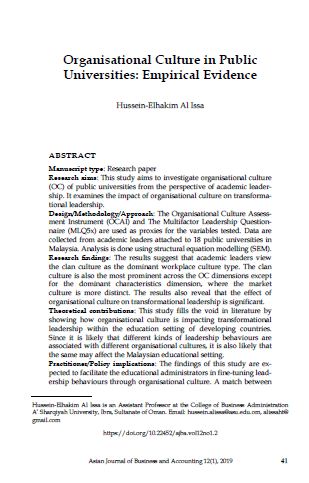Organisational Culture in Public Universities: Empirical Evidence
Main Article Content
Abstract
Manuscript type: Research paper Research aims: This study aims to investigate organisational culture (OC) of public universities from the perspective of academic leadership. It examines the impact of organisational culture on transformational leadership. Design/Methodology/Approach: The Organisational Culture Assessment Instrument (OCAI) and The Multifactor Leadership Questionnaire (MLQ5x) are used as proxies for the variables tested. Data are collected from academic leaders attached to 18 public universities in Malaysia. Analysis is done using structural equation modelling (SEM).
Research findings: The results suggest that academic leaders view the clan culture as the dominant workplace culture type. The clan culture is also the most prominent across the OC dimensions except for the dominant characteristics dimension, where the market culture is more distinct. The results also reveal that the effect of organisational culture on transformational leadership is significant.
Theoretical contributions: This study fills the void in literature by showing how organisational culture is impacting transformational leadership within the education setting of developing countries. Since it is likely that different kinds of leadership behaviours are associated with different organisational cultures, it is also likely that the same may affect the Malaysian educational setting.
Practitioner/Policy implications: The findings of this study are expected to facilitate the educational administrators in fine-tuning leadership behaviours through organisational culture. A match between these two dimensions should make the organisations more effective, thereby enabling administrators to improve the selection process of leaders and their future developments.
Keywords: Organisational Culture, Malaysia, Leadership, Public Universities
JEL Classification: M14
